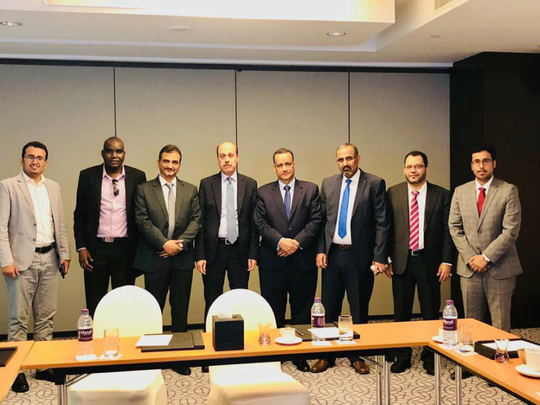
Al Mukalla: UN envoy to Yemen, Esmail Ould Shaikh Ahmad, held a rare meeting on Wednesday in Abu Dhabi with leaders of the separatist Southern Transitional Council to push them to join peace talks to end more three years of bloody fighting across Yemen.
Salem Thabet, a spokesperson for the council, said on Facebook that the UN envoy and his deputy discussed with Aidarous Al Zubaidi, the council’s leader, and other members of the council ways to end the war in Yemen and the latest security developments in Aden and other areas in southern Yemen.
Tension between the council, that includes key separatist leaders in southern Yemen, and the internationally-recognised government intensified last month when the council set a deadline to Yemen’s president Abd Rabbo Mansour Hadi to dismiss the government or face massive protests in Aden.
The council’s forces won out two days of clashes with government’s Presidential Protection forces in Aden.
The Saudi-led coalition managed to broker a deal between the two parties and end the standoff.
Last month, Ould Shaikh Ahmad said that he would resign as Yemen envoy before the end of his contract at the end of this month.
United Nations Secretary-General Antonio Guterres will appoint the Britain’s Martin Griffiths as the new UN envy to Yemen.
Meanwhile on the battlefield, fierce fighting erupted between government forces and the Iran-backed Al Houthis on Jawf, Hajja, Taiz, and Hodeida fronts amid heavy air strikes by Saudi-led coalition fighter jets.
Yemen’s Defence Ministry said that government forces pushed back an Al Houthi offensive in the newly liberated areas in Salo district in the southern city of Taiz.
As many as 11 Al Houthis were killed when Al Houthis attacked government forces in a bid to recapture new areas that they lost last week.
Government forces responded by attacking Al Houthis on several hillsides and shelled their positions in their last string of territory in the district.
Earlier this month, the Defence Ministry declared government forces had taken almost full of control Salo district after clashes with Al Houthis, who had held the area for three years.
On the Red Sea front in the province of Hodeida, government forces seized a stash of arms and ammunition, including 11 missiles, hidden in an area outside Hays town.
The arms were found as government forces comb farms and a large swathe of land outside Hays for Al Houthi militants who sporadically fire rockets at the town.
These rocket attacks have claimed the lives of at least 10 civilians since January 5.
The Saudi-led Arab coalition entered the Yemeni war in 2015 just months after an Al Houthi coup forced internationally-recognised Yemeni president Abd Rabbo Mansour Hadi out of power.
He later was able to escape house arrest and flee to Aden where he temporarily shifted government headquarters.
Since then, the coalition has gained back 86 per cent of Yemeni territory but major population centres still remain under Al Houthi control.
Saudi Arabia and the US have accused Iran of illegally smuggling weapons into Yemen to sustain Al Houthi war efforts.
One such Iranian-made ballistic missile was fired towards Riyadh last month.
Although it was intercepted, Riyadh called it an ‘act of war’.
The war has cost the lives of thousands of Yemenis and pushed the Arab world’s poorest country to the brink of famine.
The latest government push seeks to take advantage of cracks in the awkward Al Houthi alliance with former Yemeni President Ali Abdullah Saleh’s supporters.
Saleh ruled Yemen for more than three decades until he was forced to resign following an Arab Spring uprising in 2011.
He remained in the country, however, and continued to wield power from behind the scenes.
In 2014, his forces allied with Al Houthi militia, despite the fact that as president he had gone to war with them.
There had been simmering tensions between the two awkward allies in past months that boiled over in December when Saleh suggested he would cooperate with Hadi — he was assassinated shortly after.
Since then senior members of Saleh’s party have either been executed or placed under house arrest by Al Houthis amid a draconion crackdown.
While most analysts say that Saleh’s slaying could give Al Houthis the upper hand in the short term, the broken alliance between Al Houthis and forces loyal to Saleh appears to be permanent, which will help the Yemeni government and its backers in the Saudi-led coalition weaken their grip on the country given the reduction in manpower.












